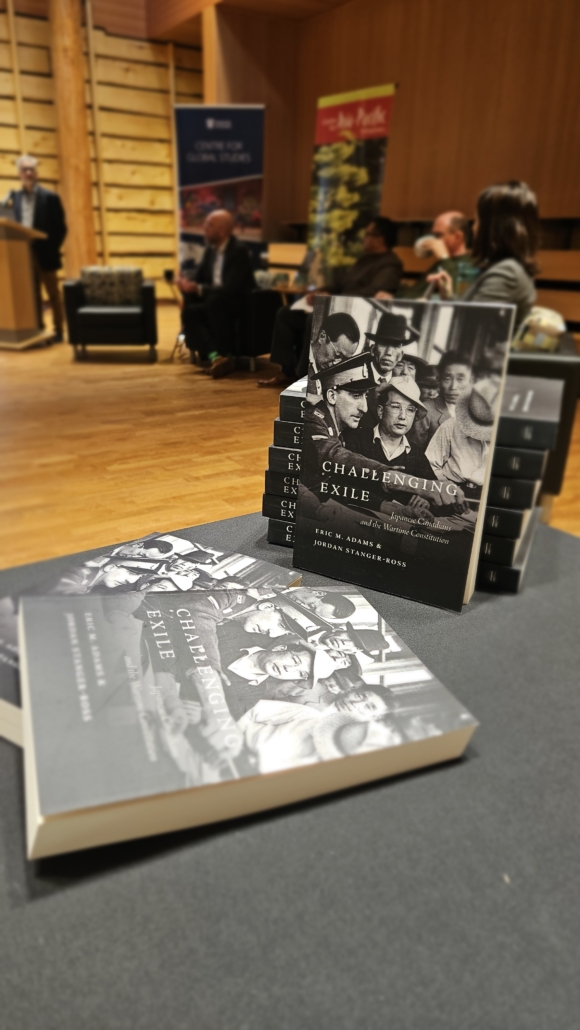Challenging Exile Book Panel Reflection
This article is a reflection on the Challenging Exile: Japanese Canadians and the Wartime Constitution book panel at the University of Victoria on November 5, 2025, by HUMA180 students Sadie Baker and Neela Singh.

Credit: Jodi Walsh
The Challenging Exile book panel, moderated by Victor Ramraj in the new Large Gathering Space in the Mary Anne Fraser Building at the University of Victoria, invited Dr. Neilesh Bose, Dr. Matt James, and Dr. Mary Anne Vallianatos to engage in conversation with Co-Author Jordan Stanger Ross. The panelists discussed themes presented in the book, each taking a different analytical perspective from their respective fields of history, political science, and law. The conversation touched on relevant topics of what citizenship means and how our government today would react in a time of perceived crisis.
What we found to be the most striking topic was our, at times, unconditional trust in our governmental institutions. Previously, we had never considered the exceptions to our citizenship. We began to think about how the trust that Japanese Canadians had in the Canadian government was betrayed. Immigrating to Canada, for most, was seen as entering a space of opportunity. During our encounter with Challenging Exile and the discussion panel, we were given an opportunity to reflect on our past as a Canadian society, and to consider why we continue to have faith in governing bodies.
Professors at the panel identified parallels between the capturing and imprisonment of Jewish peoples in Nazi Germany and the internment and exile of Japanese Canadians during the Second World War. A comparable modern example could be the current immigration issues happening in the United States, with the Trump administration deporting people with supposed unlawful presence in the US. In many cases, people are forcefully taken from their homes and sent to countries where they may not even speak the language. Evidently, questioning the implications of citizenship is not a new experience.
All of these factors have led us to question our faith in the solidity of our rights and the Inviolability of our citizenship. The Canadian government redefined the privileges and purpose of being a Canadian citizen when they chose to treat their very own people so poorly, going as far as to send them to a different country out of fear. The parallel events happening presently in the US give us the same feeling, that of losing faith in the system. We have seen repeated instances of government abuses of power. We saw it in the 1940s, we are seeing it again down in the States. Why do we continue to put our trust in these institutions if there is no guarantee our basic citizenship rights will be upheld?

Credit: Katie Dey
Description of the course:
Encountering Humanities Research (HUMA 180) is one of three classes that students in the Humanities Scholars Program take in their undergrad. The program focuses on hands-on experiences and interdisciplinary research and thinking. Students receive guest lectures from award-winning faculty members and are exposed to a variety of perspectives and fields. This course serves as an introduction to the world of humanities research, part of which includes a short practicum in which each student gets the opportunity to work under a professor at UVic to learn how humanities research works on the ground level. What drew us to the program was the opportunities it presented to gain knowledge and experience in the research field early into our university journey.

Left: Sadie Baker Right: Neela Singh

 Instagram
Instagram